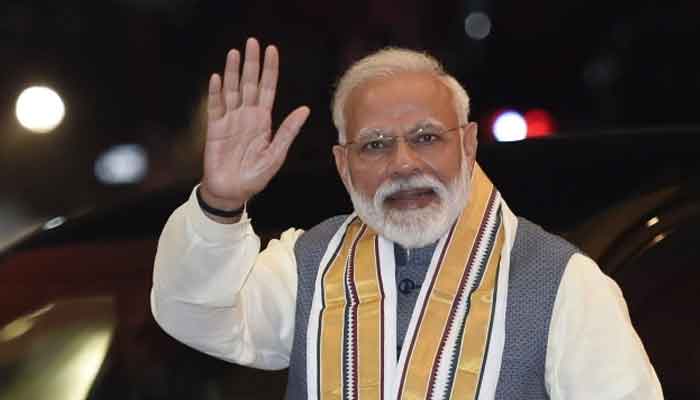Modi projected to win polls in India
Narendra Modi’s ruling alliance led by right-wing Bharatiya Janata Party (BJP) is likely to win a majority in Indian parliament in the mammoth Indian general elections that ended on Sunday, exit polls show.
NEW DELHI: Narendra Modi’s ruling alliance led by right-wing Bharatiya Janata Party (BJP) is likely to win a majority in Indian parliament in the mammoth Indian general elections that ended on Sunday, exit polls show.
The vote count is scheduled four days later on May 23.
Several early exit polls released by Indian media on Sunday predicted the BJP will lose seats but with allies would still secure a majority of the 542 seats fought, international media reported.
BJP-led National Democratic Alliance (NDA) is projected to win anywhere between 287 to 306 seats in the 545-member lower house of parliament, called the Lok Sabha, at least four exit polls showed.
The opposition Indian National Congress party-led United Progressive Alliance (UPA) was predicted to more than double its 2014 tally of 44 seats by winning anywhere between 128 to 132 seats.
The CVoter exit poll said the NDA is projected to win 287 seats, followed by 128 for the UPA.
Another exit poll released by Times Now television, Modi's alliance is likely to win 306 seats, a clear majority, while the network projected 142 seats for the UPA.
Another TV channel, Sudarshan News, projected 313 seats to the NDA and 121 to the UPA. To rule, a party needs the support of 272 legislators. Votes are to be counted on Thursday.
News18India-IPSOS poll said the Modi-led NDA will win 336 seats, while the UPA will be reduced to just 82.
One exit poll by Neta NewsX, however, forecast Modi's alliance falling 30 seats short of the majority mark of 272.
Exit polls, which have a mixed record in a country with an electorate of 900 million people, were released minutes after India concluded its mammoth seven-phase national elections, which began on April 11.
An estimated turnout of 69.61 per cent was recorded in the first phase of the elections, 69.44 per cent (second phase), 68.40 per cent (third phase), 65.50 per cent (fourth phase), 64.16 per cent (fifth phase), 64.4 per cent (sixth phase) and 64.15 per cent (seventh phase) , while the average for the first six phases was 66 percent.
As the final polling booths closed at 12:30 GMT, a huge security cordon was thrown around the voting machines and boxes of paper votes used in the vote for 542 seats in the world's biggest election.
Modi's constituency in Varanasi, the Hindu holy city in Uttar Pradesh state, was also among those to vote.
Critics say Modi has stoked fear among the country's Hindu majority of the potential dangers posed by the country's Muslims and Pakistan, and promoted a Hindu-first India.
But Modi's supporters say the prime minister and his allies are simply restoring Hinduism to its rightful place at the core of Indian society.
The opposition, led by the Indian National Congress and its leader Rahul Gandhi, have accused him of pursuing divisive policies, neglecting the economy and leaving many farmers in ruin.
Gandhi, 48, tried several lines of attack against Modi, in particular over alleged corruption in a French defence deal and over the plight of farmers and on the economy.
Modi's government fell short on creating jobs for the million Indians entering the labour market every month, the shock introduction of a currency ban in 2016, while Indian banks struggle with huge bad debts.
New Delhi-based Centre for Media Studies estimates that the outlay on this election could top $7 billion (Rs1,037 bollion), making it one of the priciest contests globally, with the lion's share of the spending by the BJP, news agency AFP said.
-
 All You Need To Know Guide To Rosacea
All You Need To Know Guide To Rosacea -
 Princess Diana's Brother 'handed Over' Althorp House To Marion And Her Family
Princess Diana's Brother 'handed Over' Althorp House To Marion And Her Family -
 Trump Mobile T1 Phone Resurfaces With New Specs, Higher Price
Trump Mobile T1 Phone Resurfaces With New Specs, Higher Price -
 Factory Explosion In North China Leaves Eight Dead
Factory Explosion In North China Leaves Eight Dead -
 Blac Chyna Opens Up About Her Kids: ‘Disturb Their Inner Child'
Blac Chyna Opens Up About Her Kids: ‘Disturb Their Inner Child' -
 Winter Olympics 2026: Milan Protestors Rally Against The Games As Environmentally, Economically ‘unsustainable’
Winter Olympics 2026: Milan Protestors Rally Against The Games As Environmentally, Economically ‘unsustainable’ -
 How Long Is The Super Bowl? Average Game Time And Halftime Show Explained
How Long Is The Super Bowl? Average Game Time And Halftime Show Explained -
 Natasha Bure Makes Stunning Confession About Her Marriage To Bradley Steven Perry
Natasha Bure Makes Stunning Confession About Her Marriage To Bradley Steven Perry -
 ChatGPT Caricature Prompts Are Going Viral. Here’s List You Must Try
ChatGPT Caricature Prompts Are Going Viral. Here’s List You Must Try -
 James Pearce Jr. Arrested In Florida After Alleged Domestic Dispute, Falcons Respond
James Pearce Jr. Arrested In Florida After Alleged Domestic Dispute, Falcons Respond -
 Cavaliers Vs Kings: James Harden Shines Late In Cleveland Debut Win
Cavaliers Vs Kings: James Harden Shines Late In Cleveland Debut Win -
 2026 Winter Olympics Snowboarding: Su Yiming Wins Bronze And Completes Medal Set
2026 Winter Olympics Snowboarding: Su Yiming Wins Bronze And Completes Medal Set -
 Trump Hosts Honduran President Nasry Asfura At Mar-a-Lago To Discuss Trade, Security
Trump Hosts Honduran President Nasry Asfura At Mar-a-Lago To Discuss Trade, Security -
 Cuba-Canada Travel Advisory Raises Concerns As Visitor Numbers Decline
Cuba-Canada Travel Advisory Raises Concerns As Visitor Numbers Decline -
 Anthropic Buys 'Super Bowl' Ads To Slam OpenAI’s ChatGPT Ad Strategy
Anthropic Buys 'Super Bowl' Ads To Slam OpenAI’s ChatGPT Ad Strategy -
 Prevent Cancer With These Simple Lifestyle Changes
Prevent Cancer With These Simple Lifestyle Changes




